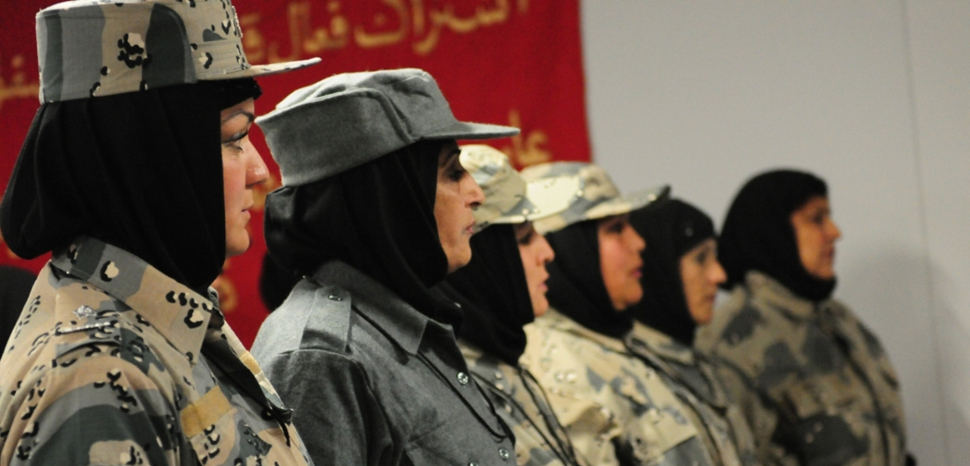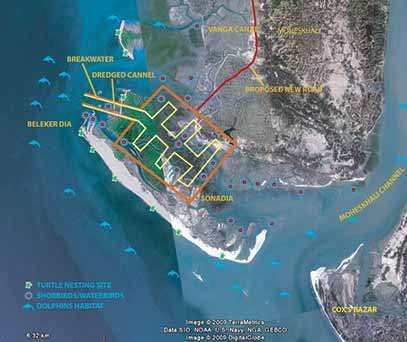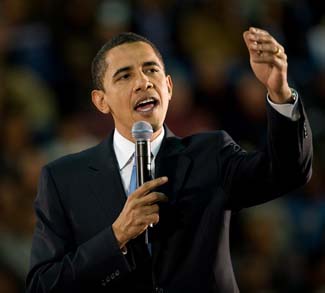In a conservative society like Afghanistan, where female participation in the public domain is not widely accepted, female presence in the security sectors remains taboo. Afghanistan is still one of the most dangerous countries in the world for women. Traditional gender norms and patriarchal mentalities in the community make it difficult for women to participate in the defense and security sectors. Since the fall of the Taliban regime in 2001, efforts have been made to rebuild the country’s security forces, including the Afghan National Police and Afghanistan National Army, and a small number of women have been included in defense and security institutions.
More than two percent of the Afghan National Police are female, which is very small in number. In order to deliver quality services to the entire population, the Ministry of Interior Affairs wants to increase the number of female police officers in the Afghan National Police Forces. Less than one percent (0.7) of the Afghan National Army is female; however, the Ministry of Defense also has plans to increase female representation. This is the first time that a significant number of women have been recruited and trained in the Afghan National Police and Afghan National Army, and it stands as an achievement for post-2011 Afghan governance, but challenges still remain for Afghan women attempting to gain entry and operate within the national security forces, as highlighted below:
Obstacles
Lack of Literacy
The level of illiteracy remains high among female police officers, and the majority struggles with lower levels of education, which prevents women from being able to access higher positions and attain leadership roles. In fact, illiteracy is still a major problem among male police officers, but the level of illiteracy is higher among women police officers. The training which Afghan police and army receive is also short-term training and inadequate to become an expert in their relevant fields. For the most part, female police and army members do not have the full technical expertise in their relevant fields, which makes it difficult for them to get promoted and occupy key positions.
Harassment and Discrimination at Work Place
Women in the defense and security sectors face harassment and discrimination from a male-dominated institutional culture. It can be an obstacle to women’s meaningful participation in security and defense institutions. As per Afghanistan Independent Human Right Commission (AIHRC) findings, women in defense and security institutions struggle with discrimination and cannot enjoy similar rights and privileges as men. Discrimination is not limited to a lack of facilities, but the male-dominated traditional culture that can lead to sexual violence and sexual harassment at the workplace. Harassment against women in defense and security institutions is also one of the major challenges, which women cannot easily talk about it because of social trauma and fear of losing their jobs. Afghanistan Independent Human Right Commission (AIHRC) monitors say that the number of those who have experienced harassment is likely to be more than what they have discovered, because some women are not willing to talk about it for fear of losing their jobs and maintaining their social status. Therefore, there is no accurate statistic to show the extent of workplace harassment within the Afghan police and army. All these incidents are happening in spite of the Anti-Harassment Law against Women and Children, which prohibits all types of harassment, including sexual harassment. The law was ratified by the Afghan government in November 2006.
Corruption and Lack of Implementation of Laws
There are number of laws which have been passed to protect women rights in Afghanistan. For instance, the National Action Plan for Afghan Women (NAPWA), Elimination of Violence against Women Law (EVAWL), and the Anti-Harassment Law for Women and Children (AHWC) have been ratified by the Afghan government to protect women’s rights in the country. However, various research has found that there is widespread corruption in government institutions, which prevents the implementation of these laws supporting the rights of women and girls in the country. There is also a lack of an effective monitoring mechanism to monitor the implementation of these laws and policies. This is why most of these laws exist only on paper, rather than becoming forces to bring about real change in the lives of Afghan women.
Lack of Promotion Opportunities
Investigations show that women are mostly in low ranks and they are not in positions of authority, whether it is defense or security. The number of women in the Special Forces or military operations is very low and they are more assigned to human resources, finance, logistics, telecommunications, and some in the aviation and technical sectors. Promotion is one of the major challenges for female police officers. Males get promoted far more often. Women get harassed during the promotion process because the institutional culture is male dominant and there is still resistance to breaking traditional and stereotypical gender roles. High levels of illiteracy and a lack of adequate training can be the reasons for a lack of promotion for female police and army members.
Poverty and Lack of Income of Opportunities
Reports suggest that poverty and the need to have a livelihood are the reasons for most of female to join in defense and security institutions. As per WPSO findings, 80 percent of female police officers expressed that joining the Afghan National Police was not a good career option for women, but rather something to do out of economic necessity and/or lack of other income opportunities. This dynamic can also lead to increased risks and vulnerabilities related to exploitation and abuses at work place. In my personal experience, I have seen a number of girls who graduated from various programs at government and private universities, didn’t find any other employment opportunities or low paid jobs anywhere, and finally turned to the Afghan National Police Force where they could garner a decent salary relatively speaking. It does not take long for them to become a police officer: they just go through a short-term, paid course and then immediately enter into the Afghan National Security Force upon completion, generally in an administrative capacity. Most of these girls, which I know are not very passionate about the police force, view the income as the only reason for joining. And though job security is the reason for most females to join up, their participation is still not widely accepted by society at large.
Traditional and Conservative Norms
Most people do not perceive female participation in the security and defense sectors as appropriate and valuable jobs, while their contribution is a must for stability of the country. In addition to this, insecurity and a lack of stability country-wide make many families worried about allowing their daughters to join the security and defense sectors. Structural gender discrimination, partly related to patriarchal institutions and traditional culture or conservative societal norms, are the major obstacles against female participation. As per Afghan Women Network findings, there are negative perceptions against female members of the security forces. Women in the defense and security sectors highlight that their presence is not institutionalized yet, and women are considered a second-class gender in these sectors.
Lack of Facilities
According to a survey by the Afghanistan Independent Human Right Commission (AIHRC), 65% of women police said that they did not have the same facilities, rights, and privileges as men in the workplace, and 35% of them said they do have access to the same facilities, rights, and privileges as men. Investigations show that women mostly in defense and security sectors have no access to separate and suitable toilets and no place to change clothes. There is no information available on how many women across the country have no access to separate toilets and dressing rooms. This problem has caused many women to change in the toilets, and some of them will come to office without wearing uniforms. This lack of a proper place to get changed gives rise to abuse and harassment against women, ultimately causing many of them to leave their jobs. As per Afghan Women Network findings, women are not receiving the same weapons as men, despite being trained in how to use them, and also there are complaints about not receiving uniforms or being issued uniforms which were made for men. In addition to this, reports also highlight they rarely have access to vehicles, limiting their ability to investigate crimes, respond to incidents, and conduct outreach to communities. Women who have children are unable to continue their work due to a lack of childcare services in police districts. Lack of adequate facilities and an unfavorable work environment have in the past dissuaded women in Afghanistan from joining police and army forces.
Conclusion
Breaking gender stereotypes still has long way to go and the presence of women in defense and security sectors is not widely accepted in Afghanistan. There is a need for lots of work to be done. Until that day, women will continue to lack any prominent role in the defense and security sectors. In fact, the challenge may be far greater than the limited available data suggests, especially as some women are not willing to speak up for fear of losing their jobs and maintaining their social status. Afghan Women are the victims of a male-centric institution that fails to value their contributions. Among the hurdles against females in the security sectors are deep-seated cultural traditions, lack of literacy, lack of proper facilities, implementation of laws, lack of women in positions of authority, and sexual harassment. These are just some of the main challenges for achieving greater female participation in defense and security sectors. The piece will be ended with few short recommendations:
Recommendations
Advocacy campaigns and campaigning through different social media platforms on the importance of a role for women in the police and army are effective ways to increase female participation. Community leaders and religious scholars can also have crucial roles in outreach campaigns, because they are most often being heard and respected by the community. Apart from that, better salaries, incentives including monetary, facilities, and other benefits will attract more women to work in defense and security institutions. Recruiting more women into the police force and eroding the current stigma associated with female police is critical for the safety of Afghan women and it will increase the stability of the country. This can also help to normalize women’ and girls’ presence in security and defense institutions; however it will take time to completely change the people’s current mindset. The present short-term training is not enough; there is a need for long-term professional and technical courses in relevant fields. Government should also have strict measures for the implementation of all policies and laws in this regard, and perpetrators should be brought to justice. These steps will help ensure that women gain a more influential role in the police and army.
The views expressed in this article are those of the author alone and do not necessarily reflect Geopoliticalmonitor.com or any institutions with which the author is associated.




